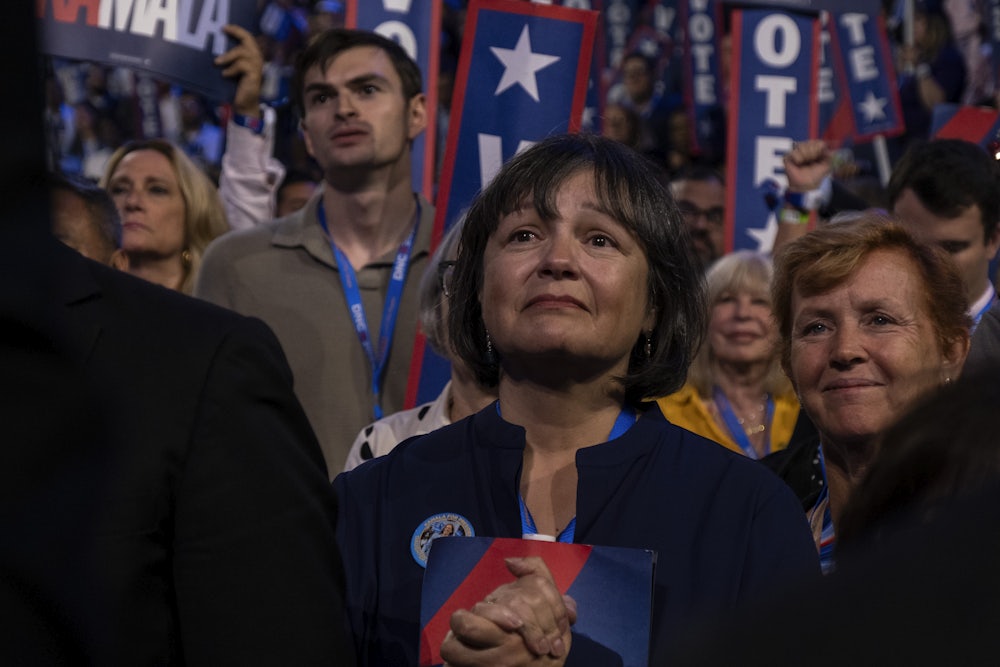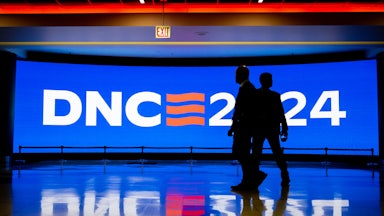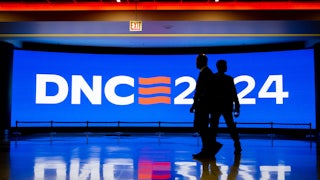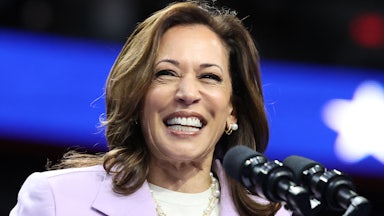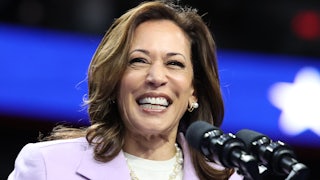If Maryland Governor Wes Moore was tired as he got to work on Tuesday morning, he didn’t show it. The Democratic National Convention had ended late—very late—Monday night, with President Joe Biden wrapping up his valedictory address at around midnight Central time. But when Moore arrived at the Hilton Chicago on Tuesday morning, sans necktie but with a pocket square and pin of his state’s iconic flag, he was ready to fire up the sleepy delegates from swing states enjoying free bagels and weak coffee.
Moore made his rounds, delivering similar—but tailored—five-minute-or-so speeches to the Michigan and Arizona state delegations at their breakfast, traveling from one half of the partitioned ballroom to the other.
Maryland might not be as unpredictable as Arizona, whose delegates he addressed second, but Moore pledged that they will not be doing the hard work of winning the state for Vice President Kamala Harris alone. “I plan on getting out there, and I will be right there with you. I will be knocking on doors, I will be making phone calls,” Moore told the Arizonans—who seemed more somewhat engaged than the Michiganders, perhaps because they had been eating breakfast for longer at that point.
Moore is exactly who national Democrats want making phone calls on their behalf. He is a hot commodity at this week’s DNC, appearing at a variety of delegation breakfasts before speaking from the stage on Wednesday.* He is young, charismatic, and attracted speculation as a potential future presidential candidate even before he was elected in 2022. This week, Moore is diverting that political star power in the direction of Harris, the Democratic nominee for president, and Minnesota Governor Tim Walz, her running mate.
After each of his Tuesday pep talks, Moore was lightly mobbed by well-wishers and selfie-takers, who approached him with the occasionally somewhat sheepish self-awareness of political junkies who know they’re shaking hands with somebody who could really be somebody, maybe two or three conventions from now.
“It’s a marathon that we’re running like a sprint,” Moore told me with a smile after his breakfast remarks. We chatted in the labyrinthine hallways behind the Hilton ballroom, a liminal space between the caterer and the catered-to that seemed fully appropriate for a man between events.
Moore attributed the interest in his speeches less to himself as a politician, and more because “people are really excited about what’s happening in Maryland right now,” pointing to the rapid drop in violent crime and policies such as a free service year for high school graduates and an expanded state child tax credit. (To be fair, it would be unusual for a politician to outright say voters from other states wanted to take pictures because they were just that charismatic.)
“I’m thankful that people are paying attention, and I want to use that energy and that belief to make sure that I have the partner that I need for the next four years, and that’s Vice President Harris,” Moore said.
Every nominating convention closely resembles those that came before. There are the political celebrities who pontificate in prime time and the next big things glad-handing with would-be supporters. Costumed delegates doing their best to make their state stand out. A small army of worker bees hand out the ever-changing signs and check badges. If you bet on there being a balloon drop at the end, you’re sure to make money off of whatever politically unaware bookie would take the offer. But for all the familiar sights and sounds, this particular convention has the air of the unexpected.
Remote observers may believe the primary focus of the DNC lies in the words “Democratic” or “National,” but the operative term is actually “Convention.” The DNC is, above all, a gathering of stakeholders invested in the success of their party; they are primarily, although not entirely, the choir to whom the speakers are preaching. The convention doesn’t begin each evening at the United Center, ready to beam into viewers’ living rooms. Each morning, delegates, staffers, politicians, volunteers, reporters, and assorted hangers-on start the day with early breakfasts at luxury hotels throughout the city. They attend meetings of various party caucuses and councils throughout the day at the McCormick Place convention center.
They then travel by train, shuttle, or rideshare to the United Center—usual home of the Chicago Bulls, current home of the evening festivities—to watch Democratic rising stars of the past, present, and future deliver remarks with varying levels of skill, investment, and audience engagement, sandwiched between slickly produced campaign videos. (This commute is a logistical nightmare that one feels could have been avoided if event planners deemed McCormick Place sufficiently photogenic.) They perambulate the perimeter of the arena to buy overpriced sodas, to see and be seen. It’s a family reunion, a four-day business meeting that could have been an email (or Zoom call, like the previous Covid-era convention of 2020), and an overstuffed pep rally in one chaotic package. Thousands of reporters have traveled to Chicago to mostly watch what’s happening on television.
Like any proper spirit event, the convention comes with costumes: attendees wearing various American flag–themed apparel, light-up clothing—the Wisconsin delegates, as always, have brought their cheese hats. A mother-daughter pair of delegates from Florida wore home-constructed hats and bright pink jackets emblazoned with the message “#4 Florida” in lights, referring to the ballot initiative that would expand abortion access in the state. “We’re bringing the energy, not only here, but also in Florida. We’re going to bring it back,” said Savannah Atkins, the daughter and delegate, bearing bright magenta lipstick to match her jacket and her enthusiasm.
Representative Deborah Ross of North Carolina described the atmosphere at the convention as electric and “hopeful.” Like Atkins, she believes that momentum is transferable to attendees’ home states. “The last election was during Covid. So we couldn’t be together. We couldn’t do the canvassing and door-to-door like we did before, and all of that is pouring back in a monumental way,” Ross said.
But the atmosphere at the convention was not universally upbeat. This is the second thing that sets this convention apart: Many of the delegates are “uncommitted,” meaning that they do not represent a particular candidate. Voters across several states, but notably “blue wall” states like Michigan and Wisconsin, voted “uncommitted” due to their frustration with Biden’s response to the war in Gaza. The convention attracted some protests outside of the United Center, to which the police responded with additional barricades. A brief protest on the convention floor Monday night during Biden’s speech was shooed off by other convention goers.
Late Tuesday morning, several Palestinian American leaders and advocates met with reporters on the second floor of the Radisson Blu Hotel.
“I absolutely understand and totally empathize with their excitement. To be clear, it’s hard not to be excited,” said Ruwa Romman, a Democratic state representative from Georgia. “If you are a thief of joy, people are way less likely to listen to you.”
Romman, who is Palestinian American, wants to see delegates at the convention engaged in the serious discussion around the nation’s Israel policy along with the more celebratory atmosphere. Voters who turned away from Biden over Israel’s actions in Gaza, which have resulted in the deaths of around 40,000 Palestinians, may be pivoting back to Harris, as she has been more willing than the president to express dismay over the death toll.
Although there was a panel discussion on Palestinian human rights on Monday, advocates would like to see more from the DNC, including an as-yet-unsuccessful effort to have a speaker representing the “uncommitted” movement deliver remarks from the convention stage. Romman said she would also like to see Harris commit to putting “barriers to the mass murder of our people” by ending arms sales to Israel in accordance with laws that prevent weapons transfers to countries violating human rights.
“I think that would go a really long way to show, ‘Hey, I’m willing to stand with you. Just stand with me through November, and I promise not to leave you after I get elected,’” Romman said. “A lot of people are scared, if they don’t get what they want before November, then the mass slaughter is never going to stop.”
If the DNC had been held just one month before—at around the time former President Donald Trump appeared at the Republican National Convention, in mid-July—the atmosphere in the United Center might not have been so jubilant, or so lightweight. Mere weeks ago, Biden was seen even by many fellow Democrats as a flailing candidate floundering in the polls. This was a time of despondency for many in the party, with the possibility of a blowout loss in November looming as a potential dreaded ending to 2024.
Weeks later, those same Democrats are buoyed by the belief that momentum may be on their side.
Chris Porter, a delegate from Washington state walking around the United Center bedecked in a head-to-toe rainbow suit, said that the change in candidate had him revisiting his initial trepidation about going to Chicago. “The ballot changed, and I went, ‘Oh my God, I’ve got outfits to plan!’” Porter said. “At that moment, I was feeling my whole perspective and energy change.”
As delegates cast their votes for Harris in the roll call on Tuesday evening, a tradition that involves extolling the virtues of their states with a peppy song in the background, several mentioned the historic nature of Harris’s nomination. As the roll call started, Porter wondered how lively it would be—after all, the delegates had conducted a virtual roll call vote weeks earlier. “But as it turns out, as the first state got started, just the momentum, the energy, the excitement, was building and building and building,” Porter said. That energy was maintained even to Washington, one of the last states to be called. “When they got to Washington, I was giddy again, jumping up and down.”
When California’s delegates, led by Governor Gavin Newsom, cast their vote for Harris, it was to the background of the song “Not Like Us” by Compton’s own Kendrick Lamar—a diss track against fellow rapper Drake. It was a subtle expression of confidence, a lip-curling dismissal of an opponent, the opposite of the anxious vibe that so recently dogged Democrats.
The night was capped with a speech by former First Lady Michelle Obama, who delivered remarks that could never have been given for Biden—beginning with the fact that they emphasized Harris’s background as a Black and Indian American woman, connecting the nominee with the experiences people of color across the country.
“America, hope is making a comeback!” Obama said, harkening to her husband’s 2008 campaign slogan—another historic candidacy.
When former President Barack Obama—a Democratic convention mainstay since he delivered a barnburner oration of his own twenty years ago—then delivered his speech to conclude the night, it was a reminder of his career-making remarks as an Illinois state senator in 2004. But it also signaled that his iteration of the Democratic Party is now a historic one. The party belongs now to Harris, who does exist in the context of all that came before her—namely, Biden, and before him, Obama.
But in the conventions to come, who knows? It may belong to Moore, or the pink-clad delegates from Florida and the rainbow-wearing Porter, or Romman.
As Moore told me on Tuesday morning, somewhere in the bowels of the Chicago Hilton, the sentiment of Democrats could be reflected thusly: “This week is going to be a good week, because I think the American people are going see not just the contrast that we have, but why it’s so important to make sure that we elect Kamala Harris in November.”
If Harris wasn’t at the top of the ticket, that contrast made by Americans could have been very different.
* This post originally misidentified the date of Moore’s appearance at the convention.
